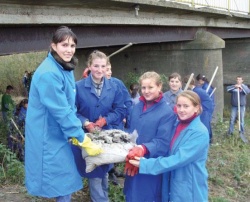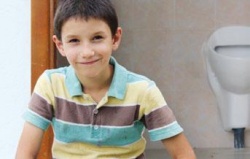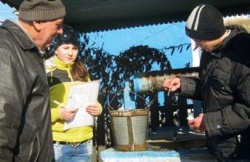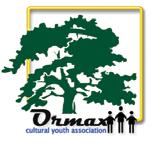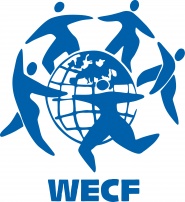Water and Sanitation Safety Plan program - Awareness raising story from Moldova
Country: Moldova
Contents
[hide]Students can themselves become the water experts
Basic data:
The Safe Water and Sanitation for all in The Republic of Moldova initiative was a project initiated by Ormax NGO to improve the situation in rural The Republic of Moldova by mobilizing citizens and the authorities to realize and respect the right to access safe water and sanitation through the sustainable management of local resources. Such implementation includes maintaining clean water sources to improve human health, which helps to maintain the environmental integrity of aquatic ecosystems, and thus contributes to protecting biological diversity.
Ormax received the UN Water "Water for Live" Best Practices Award for the action.
The project and the experiences:
Only 15% of rural Moldovans have access to running potable water in their houses and only 55% have access to basic sanitation (defined as a pit latrine with a lid), and rural schools in Moldova usually rely on shallow wells for drinking water, but the water is often contaminated with bacteria and nitrate. However, rather than installing new infrastructure, the NGO Ormax took a different approach than many others and first initiated a campaign focused on education, capacity building, and mobilisation of the population, a programme based on the water safety plan approach of WHO, adapted by WECF, and carried out by local Moldovan partners Ormax, Wisdom and Renasterea Rurala. From 2010 to 2011, the pupils were trained on water and sanitation topics, including linkages between health and WASH, and they then analysed the situation in their own schools and villages.
Their activities include:
- Observation of water turbidity as an indicator of water quality
- Measurement of nitrate concentrations using nitrate test sticks
- Simple bacteriological tests
- Inspections of the drinking water wells
- Assessment of potential risks to the drinking water sources, including those from agriculture and pit latrines or leaking septic tanks
- Mapping the information gathered for the village.
Based on these observations and analyses, they were able to raise awareness among the population and start to take actions to improve the situation.
The wells with high nitrate levels are of particular concern for families with small children. The pupils were able to inform these families about nitrate levels in their water and mark the wells that are not suitable for food preparation. The impact of the activities is visible as changes in community behaviour: no more solid waste is dumped near the public or private wells, mapping of wells continues today, and spring cleaning of wells is once again a tradition in the communities.
“All the pupils of the school were involved in well inventorying and well testing and after the first tests we found, that the results confirmed that the school was supplied with water from one of the most polluted well of the village (500 mg/l nitrate),” explained Sergiu Colesnic, Ormax volunteer and employee of the village Zgurita. These results were presented to a foreign NGO that was visiting the village. One week later, a volunteer from the NGO equipped the school with a filter and now the children can drink water of a good quality at least at school. “We don’t have enough money to make big changes in our communities, but sometimes, we have to do our best and prove that we want to improve our situation. We continue our work at local and national level, and we are trying now to collect funds to rehabilitate the water supply in the village and have safe water for our children at home too,” reported Sergiu, who is also the father of three small girls in the village.
After a two-year long, successful educational campaign in 10 villages in northern Moldova, a demonstration ecosan toilet was constructed for the school in Hasnaseni. The first ecosan school toilet in Drochia has been serving its 250 pupils since the end of 2011. Around 7 individual ecosan toilets were constructed ever since and the demand from local population for access to safe, hygienic and modern sanitation facilities is very high. In order to promote new innovative technologies for rural communities in Moldova, Ormax is now working towards the establishment of the First Ecological Center of Social Innovation to serve as a resource center, manufacture, consultancy services, and provider of training and support to local craftsmen and the local population.
The key lessons of the story
The public participation was a determinant factor in the success of the project. In order to effectively introduce community based approach initial community mobilization and adapted trainings on relevant technologies are needed. Another factor of success was the authorities support and participation. The initiative involved local, regional, and national authorities in all the activities and found that their support motivated public participation.
Contribution to the SuSanA sustainability criteria
Promote health and hygiene effectively:
Students become the water experts in their village.
Socially acceptable and institutionally appropriate:
The Water Safety Plans which are developed by the students are adapted to the local conditions
Protect the environment and natural resources:
Water Safety Plan is aiming at water protection.
Be financially and economically viable:
The Water Safety Plan education does not require high costs but leads to high impact in terms of water quality and hygiene.
Project details:
Project location: Zgurita, Dominteni, Hasnaseni in Moldova
Coordinator: WECF
Funding: Danielle Mitterand-France Libertés, Church World Services
Project partners: Ormax
WECF (Women in Europe for a Common Future) is a non-governmental organization established in 1994 following the 1992 Earth Summit in Rio de Janeiro, to give women a stronger voice in the field of sustainable development and environment. WECF strives for balancing the environment, health and economy, taking the different needs and perspectives of women and men into account and implements solutions locally and influences policy internationally.
Ormax Youth Cultural Association was founded on 26 October 1996 and registered on 28 January 1999 in Drochia, Republic of Moldova in order to improve the ecological situation by the empowerment of the civil society in the fields of the environmental and ecological development. Ormax contribute to the education of the population via information and environmental technologies promotion.
Contact
Oleg Rotari
Ormax
ormax![]() mail.ru
mail.ru
Margriet Samwel
WECF
margriet.samwel![]() wecf.eu
wecf.eu
